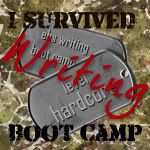Show, Don’t Tell, by Lissa Bryan

Lissa Bryan is the awesome author of Ghostwriter (2012) and The End of All Things (2013) and is currently working on a new novel. She helps new authors with her suggestions, support, writing lessons, and with her great kindness. Her blog: http://lissabryan.blogspot.com/
^^^^^^^^^^^^^^^^^
That’s one of those bits of ubiquitous writer’s advice you always see. I said it myself to a new writer just a couple of weeks ago after being asked to critique a piece they had written. The writer expressed frustration. “People have said that to me before, but I don’t know what I’m doing wrong!”
I’ve been there. I once got a review that said my work had the same flaw, but I couldn’t see where I’d made the mistake. It took a while before I understood what I was doing, and I’m working on ways to correct this flaw.
Essentially, it boils down to the difference between saying
“He was frustrated,”
or saying,
“He paced, raking his hands through his hair as he muttered to himself.”
In the first example, we’re told what the character is feeling. In the latter, we see his agitation through his body language.
There are several useful resources on the internet, such as the “Body Language Cheat Sheet” which can help you show your character’s emotional state. Another suggestion is to monitor your sentence structure in areas of tension: short, terse sentences can help set the mood.
Another sign that you may be “telling, not showing” is using a lot of adverbs. One of the first things my editors did for me with my second manuscript was go through and highlight all of the words that ended with “-ly” and I was surprised to see how many there were.
Original: “Stop it,” he said angrily.
Re-worded: “Stop it,” he said, and his eyes narrowed as he clenched his jaw.
The second sentence shows more action and is more “visual” than the first version. It helps the reader see the story as a movie in their minds, as opposed to having to supply the details themselves.
I’m still learning about this, myself. But I believe writing is a life-long learning experience, and I hope to keep improving as I go.
^^^^^^^^^^^^^^^^^^
Thank you, Lissa!



























I like these clear examples! Thank you, Lissa! I think we've all gotten the feedback at some point to show, not tell, but I'm glad I am not the only one who wondered at times how to improve on that!
ReplyDeleteHi Dooba!
DeleteThanks for your comment! Lissa's lessons are always very useful, aren't they?
I'm glad you enjoyed this post.
- Raum
hi, keep up the good work
ReplyDelete